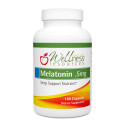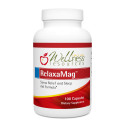HEALTH NEWS
Improve Your Sleep-Wake Rhythms for Immune Health
April 13, 2020

Are you getting enough restful sleep? How is your daytime energy? When life’s daily routine gets out of sync, it influences your internal circadian rhythms and body clocks. Your immune system’s vitality relies on this most primal action, making it imperative to keep your body rhythms in sync.
Your Body Clocks Are A Master Symphony of Synchronization
Your brain has a master clock called the SCN (suprachiasmastic nucleus) found deep in the brain’s limbic system. The SCN integrates and meticulously sets the tempo for every clock found throughout your entire body like a master orchestral conductor. Each organ system has clocks. Cells have molecular clocks. These clocks provide feedback and signals to the SCN engaging and managing the natural ebb and flow rhythms and functions of your body, including your immune system.
Circadian Rhythms, Sleep, and Immunity
In the last 50 years, research on circadian rhythms has grown from understanding the basics to being able to map out intricate orchestrations for various systems. An article entitled “Perfect timing: circadian rhythms, sleep, and immunity – an NIH workshop summary” and other recent articles helps shed light on the circadian rhythms and immune health. This timely article from January 2020 gives us insight into current immune-challenging concerns. It tells us that disruption of day-night routines and circadian rhythms profoundly impacts essential immune functions and weakens health. Restoration of healthy day-night, wake-sleep routines supports your circadian rhythm and body clocks which helps immune system function and vitality.
Scientists determined when cell molecular clocks function in non-disrupted circadian rhythms, immune cells fight germs better with less overall loss of health. However, if the circadian rhythm and cell molecular clocks were disrupted, changes occurred with Th17, neutrophils and other immune cells. Disrupted Th17 and neutrophil function were linked with increased infection risk and autoimmune disorders.
In another study, scientists evaluated clock signals, several immune cells, and lung health in animals in context with immune challenges. When day-night circadian rhythms were intact and healthy, immune cells were more able to fight germs and there was considerably less oxidative stress and inflammation in the lungs.
Sleep quantity also affects circadian rhythm functions. Human studies show that when individuals get less than 6 hours of sleep on a long-term basis, their immune system is more fatigued and inflamed. They have fewer antibody titers after vaccination and there is increased vulnerability to viral insults. Short-term sleep disruption also disrupts regulation of circadian rhythms within the blood and lung tissues provoking more acute oxidative stress and free radicals.
Chronically disrupted body clocks provoke chronic and excess inflammation which disrupts a healthy immune response to invading germs. The study of chronobiology and body clocks now proves what you know from experience – the more run down and exhausted you are from disrupted schedules and lack of sleep, the more likely you will “get hit with a bug”. Science also shows that biological clocks and circadian rhythms are disrupted by viral challenges. Keeping a daily rhythm and routine is essential for health and recovery!
Factors that Affect Circadian Rhythm and Biological Clocks
Whether you stay up late at night to watch a movie, have young children waking you up in the middle of the night, have multiple bathroom trips, or pull a double at work, you know how out of sync you feel the next morning when sleep is off. Circadian rhythm disruption also occurs with shift work, travel and social jet lag, and artificial lights at night.
Blue light exposure from tech devices and TVs, EMF exposure, cigarette smoke and e-cigs exposure, and disrupted body temperature regulation are factors that disrupt the SCN, cellular circadian rhythms and/or melatonin, the sleep hormone involved with circadian rhythms.
Too much light at night and too little light in the morning can lead to asynchronization of the body clock. Think about your teenager who uses tech devices late at night staying up all hours and then sleeps past noon. These modern living choices further disrupt the normal synchronization of your 24-hour body clocks which affects the levels and activity of melatonin and serotonin and normal biorhythms.
Natural daylight first thing in the morning on a regular, daily basis is the most important primary regulator for your SCN master clock. In addition, social interactions, meal times, daily routines, and physical exercise synchronize your SCN and cellular clocks circadian rhythm.
In this time of disrupted routines, you want to maximize health and immune support with balanced schedules with daylight, physical activity and regular meal times. Additional information may be found in the article Body Clocks and Weight Management – It’s All About Timing.
Key Nutrients
Nutrients play enormous roles in circadian rhythms and biological clocks and must be present for the circadian rhythm function. Critical substances include melatonin, magnesium, and acetylcholine.
Melatonin
Melatonin, is a powerful antioxidant and hormone produced by the brain and provides integral support for circadian rhythms, immune modulation and immune regulation of germ management. Melatonin influences cues to the SCN and cellular clocks throughout your body. Remember to avoid blue light exposure, artificial light at night, and EMF exposure at least 2 -3 hours before bed to aid in natural melatonin release.
Magnesium
Magnesium is absolutely critical for circadian rhythm. This mineral directly influences the SCN master clock and the pineal gland which produces melatonin. Conversely, if body clocks are already disrupted, it is harder for magnesium to work inside of cells. This process can be helped by getting behavioral routines in place with sunlight exposure during the day and removal of blue light etc. to support your own melatonin production at night. Extra supplemental melatonin with magnesium can be used for synergistic support.
Acetylcholine
Acetylcholine, a memory neurotransmitter, is greatly involved with the SCN and daily cellular rhythms. It helps provide biochemical “time stamp” to cells which is like setting a neurochemical alarm clock reminder inside cells to wake up at certain times.
High concentrations of acetylcholine are used in the brain to help with wakefulness and resetting of the circadian rhythm. A simplistic view is to think of acetylcholine with daytime, memory, and wakefulness. The opposite is melatonin with nighttime and sleep. Nutrients like acetyl-l-carnitine, pantethine, alpha GPC choline, and CDP choline help support acetylcholine activity and levels.
Additional Support
A healthy gut microbiome also critically affects circadian rhythms as your gut flora talk with the brain and internal clocks.
Nerves in the SCN also produce GABA, the primary relaxant or inhibiting neurotransmitter. This helps with rest, sleep, and relaxation. L-theanine aids in support of GABA and relaxation responses.
If you are feeling out of sync, start your day with daylight exposure first thing in the morning. Open your curtains or blinds. If you can get outside, that is even better. If it is a cloudy day, then use full-spectrum lighting to help aid your circadian rhythm.
Reduce or avoid blue light exposure before bed. If you have exposure to blue light and chronic sleep pattern disruptions, then use magnesium and melatonin together. Note that magnesium and choline are commonly lacking in the Western Diet for all ages. Numerous medications also deplete magnesium and choline.
The effect of a healthy circadian rhythm and the interplay between body systems is like a master conductor working with meticulous and artfully skilled musicians coming together to perform a grand orchestral arrangement. The music happens seemingly without effort and with stunning beauty when in sync. However, when the beat gets out of step, the music stumbles. Strive to get your circadian rhythm back in balance and see what kind of concert your clocks and rhythm sections provide. Your health depends on it.
Related Posts
GABA and l-theanine mixture decreases sleep latency and improves NREM sleep.
Published : 04/10/2020 11:28:59Introducing Vital UT with Cranberry, D-Mannose, Mangosteen, and Friendly Flora
Published : 04/06/2020 12:07:35
Share this content
Recent News
What Are Endothelial Cells and How Do They Impact Heart Health?
PQQ: Powerful Antioxidant for Mitochondria, Energy, and Longevity
Stay Strong & Energized: How CoQ10 Supports Your Muscles and Heart Health
Male Plus: New Formula for Prostate, Testosterone, and Vitality
Beat the Winter Blues: 6 Key Nutrients to Keep Up Your Mood and Energy






